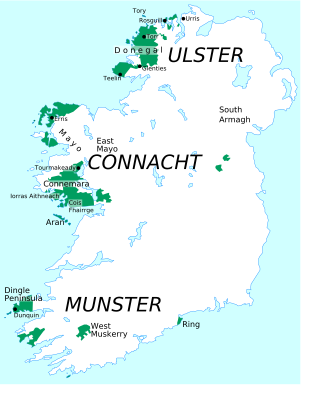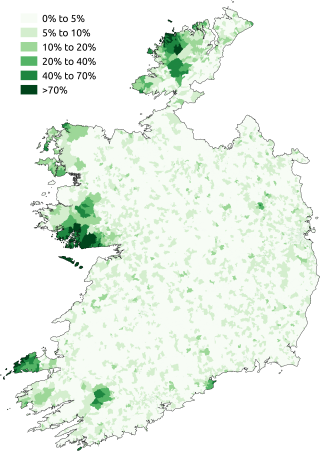
A Gaeltacht is a district of Ireland, either individually or collectively, where the Irish government recognises that the Irish language is the predominant vernacular, or language of the home. The Gaeltacht districts were first officially recognised during the 1920s in the early years of the Irish Free State, following the Gaelic revival, as part of a government policy aimed at restoring the Irish language.

A Gaelscoil is an Irish language-medium school in Ireland: the term refers especially to Irish-medium schools outside the Irish-speaking regions or Gaeltacht. Over 50,000 students attend Gaelscoileanna at primary and second-level on the island of Ireland. Additionally, more than 13,000 students are receiving their primary and second level education through Irish in the Gaeltacht. Gaelscoileanna and Irish-medium schools in the Gaeltacht are supported and represented by Gaeloideachas and An Chomhairle um Oideachas Gaeltachta & Gaelscolaíochta or COGG in the Republic of Ireland and by Comhairle na Gaelscolaíochta in Northern Ireland. The largest patron body of Gaelscoileanna in the Republic of Ireland is An Foras Pátrúnachta, although the vast majority of schools under their patronage are at primary level.
An Gúm was an Irish state company tasked with the publication of Irish literature, especially educational materials. The agency is now part of Foras na Gaeilge. Its mission statement is "To produce publications and resources in support of Irish-medium education and of the use of Irish in general." It is the largest publisher of books in Irish in the country. As of 2010, Seosamh Ó Murchú was the senior editor.
Tearma.ie is the website of a lexical database for terminology in the Irish language. It is funded by the Irish state and Interreg and maintained by Fiontar & Scoil na Gaeilge, the Irish-language unit of Dublin City University, in collaboration with the Terminology Committee of Foras na Gaeilge.
The Gaeltacht Quarter in Belfast, Northern Ireland, is an area surrounding the Falls Road in the west of the city. A Gaeltacht is an area where the Irish language is spoken. Unlike the traditional Gaeltacht areas in the Republic of Ireland, Belfast's Gaeltacht Quarter does not have legally defined geographical boundaries. The Quarter serves as a socio-linguistic hub focused on the Falls Road/Andersonstown Road corridor in the west of the city, and aims to promote Irish language and Irish culture in the area and to develop associated tourist attractions.

Raidió na Life 106.4FM is an Irish-language radio station founded in 1993 and broadcasting in County Dublin, Ireland. In addition to being transmitted on FM, the station's output is available worldwide via the internet.
An Foras Pátrúnachta na Scoileanna Lán-Ghaeilge Teo. is the largest patron body of gaelscoileanna in the Republic of Ireland. It was founded in 1993 to act as an alternative patron body for gaelscoileanna. The organisation's name is usually abbreviated to An Foras Pátrúnachta. 70 gaelscoileanna, which constitutes as of September 2017 44% of all the gaelscoileanna in the Republic of Ireland, are under the patronage of An Foras. In late 2017, they announced that from September 2018, school students under their patronage in schools would learn a third language alongside Irish and English in both primary and second-level and be taught one subject through that language. Their Ard-Rúnaí is Caoimhín Ó hEaghra. He is a brother of national Irish journalists Cormac Ó hEaghra and Róisín O'Hara.
A Neo-Gaeltacht is an area where Irish has a strong presence as a spoken language but is not part of the officially defined or traditional Gaeltacht areas. It has been argued that non-Gaeltacht activist groups wishing to establish an Irish language community need to show that it is large, permanent and formally organised and that it has a growing number of people using Irish as their first language. Another objective is a situation in which children use Irish among themselves and with other Irish speakers in a natural way while being able to deal with a largely English-speaking world.
Joe Steve Ó Neachtain was an Irish writer, actor, playwright and broadcaster in the Irish language. He was well known for his portrayal of Peadar Ó Conghaile in the long-running soap Ros na Rún. Ó Neachtain, a native Irish language speaker, was born in Cré Dhubh, An Spidéal, County Galway.

Acadamh na hOllscolaíochta Gaeilge is a third level educational and research institution headquartered in Galway, Ireland. It was established as part of the National University of Ireland - Galway in 2004, to further the development Irish-medium education. The academy works in co-operation with faculties, departments and other university offices to develop the range and number of programmes that are provided through the medium of Irish on campus and in the academy's Gaeltacht centres.
A naíonra is an Irish medium playgroup for pre-school children, which follows the principle of Total Early Immersion.

The official status of the Irish language has remained high in the Republic of Ireland from foundation. This reflects the dominance of the language in Irish cultural and social history until the nineteenth century and its role in Irish cultural identity. In 2022, strong recognition was added in Northern Ireland also. In the 2022 Republic of Ireland census 1,873,997 people or 39.8% of the population in the Republic of Ireland said that they had some ability to speak Irish, out of an overall population of 5,149,139. In Northern Ireland 228,600 people (12.4%) have some ability in the Irish language according to the 2021 census for Northern Ireland, out of a population of 1,903,175 people. It has been found, however, that while ideological support for Irish is high, actual routine use is very low, and that there is very little or rare correlation between personal fluency in the language and the perceived value of Irish as an identity-marker. Nevertheless, the language benefits from the support of activists who continue to use it as a social and cultural medium.
Tuairisc.ie is an online Irish language newspaper. The company's offices are in Bearna, Co. Galway, in the west of Ireland.

A Gaeltacht Service Town is an area designated under the Gaeltacht Act 2012, situated in or adjacent to Gaeltacht areas in Ireland, that have a population of over 1,000 people, and which play a significant role in providing public services, recreational and commercial facilities for Gaeltacht residents.
An Irish Language Network is a designation applicable to areas in both jurisdictions on the island of Ireland.
An Chomhairle um Oideachas Gaeltachta agus Gaelscolaíochta / COGG is a Republic of Ireland State-agency who serve as a consultative council to the Irish Department of Education and other organisations and individuals on Irish language-medium education and who also provide support services and teaching resources and carry out research for Irish language-medium schools both inside and outside the Irish-speaking regions or Gaeltacht in the Republic of Ireland. Their name translates into English as The Council for Gaeltacht and Gaelscoileanna Education. The name is usually abbreviated as COGG for short. The Comhairle ("Council") was appointed for the first time in 2002 and has been reappointed on four occasions since then. They are a separate organisation to the Northern Ireland Comhairle na Gaelscolaíochta.

Gael-Taca is an Irish language promotional organisation in County Cork in the Republic of Ireland. They are based on Sullivan's Quay in Cork City where they run a shop and café. The organisation focuses on promoting the Irish language in the business sector and on trying to expand the number of Irish language immersion schools or Gaelscoileanna in County Cork.
Comhairle na Gaelscolaíochta or CnaG is the representative body for Irish-language medium education in Northern Ireland. Its name translates into English as the Council for Irish-language medium education. It was established in 2000 by the Northern Ireland Department of Education to promote, facilitate and encourage Irish-language medium education across Northern Ireland. As of early 2021 there are over 90 schools providing Irish-medium education to over 7,000 students at pre-school, primary and post primary level in Northern Ireland. Comhairle na Gaelscolaíochta is a separate organisation from the Republic of Ireland's An Chomhairle um Oideachas Gaeltachta & Gaelscolaíochta or COGG.






